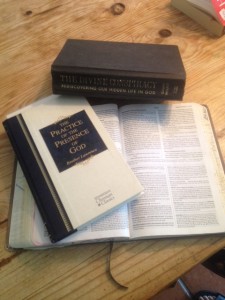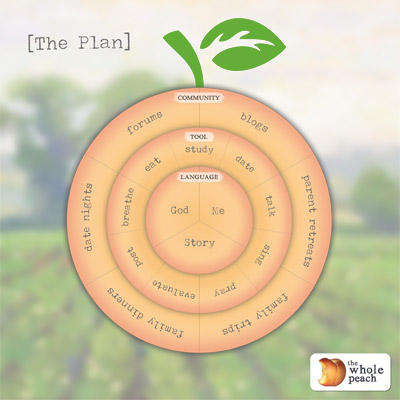Syndromes and Sight
Posted by karlahagan on Aug 4, 2015 in A Story, Blog | 0 comments
 Coming to the table this morning.
Coming to the table this morning.
Beginning this day in conversation.
Saying again – I believe there is more beyond my circumstance and ability, and I need help. My circumstance has disappointed, and my ability has failed. And for those days when circumstance is “rolling,” and abilities seems to be working to my advantage, I still must grapple with the reality that this could change in an instant.
Will I depend on this that I can see, or do I believe the Bible? Again, if I am not willing to chunk the Bible out the window, then I must “come to the table,” and I must “begin the day in conversation.”
My Father has told me it is in my best interest, and most importantly he has told me he desires the time.
So, I made the decision to first come to the table, and I opened myself up to the need for a conversation. But what should we talk about? I had no idea.
I went to a friend for some help.
I pulled Brother Lawrence (The Practice of the Presence of God) from my bookshelf and began thumbing through the pages reading my marks from previous reads. This word got my attention – blindness.
“[Brother Lawrence] complains much of our blindness, and cries often that we are to be pitied who content ourselves with so little. God . . . has infinite treasure to bestow, and we take up with a little sensible devotion which passes in a moment. Blind as we are, we hinder God and stop the current of his graces.”
And so the conversation begins . . . .
“Father, I don’t want to live blind. I want to see. See this life and my days as you see them. I don’t want to miss out on the treasure you have to give. I don’t want to settle and stop the opportunity for the ‘more.’ Help me to see.”
Next step – open the Bible to the concordance and see what he has to say back to me on this idea of seeing. Very simply, I look up “see.”
11 verses on the subject – I read through each phrase, and here are the 2 that got my attention – Isaiah 40:5 and Matthew 5:8. At least, that is as far as I roamed today.
“And the glory of the Lord shall be revealed, and all flesh shall see it together.” Isaiah 40:5
“Blessed are the pure in heart, for they shall see God.” Matthew 5:8
Hmmm . . . . So, if I am asking for sight, in one verse, everybody is getting it, and in the second only the “pure in heart.” Problematic. Which is it? What do I need to do to get this sight?
My initial thoughts are this: “pure in heart” is a core issue of motive and thinking. Less to do with action but what my action shows from the inner workings of mind and heart. As I am someone suffering from “excellent flesh” syndrome, I get that. My battles mainly show up between the ears. So, to focus on the inner workings is always a good reminder. What is going on in my thoughts? What lie am I embracing? What judgement am I passing? What pity am I accepting?
But there was more in the conversation this morning. So grateful – along with “excellent flesh” syndrome, I also suffer from “living for God instead of from God” syndrome. Both verses had more to say to me!
Isaiah 40 is a rich chapter heralding the coming of the Messiah in our midst and promising comfort to the Israelites while in exile in Babylon. In a few verses above Isaiah 40:5, God also says to Isaiah to speak to “my” people. Then, he tells him how to speak by using the adverb “tenderly.” I am sucker for all things parts of speech. It is the English teacher in me, and I take notice. First of all, he adds an adverb to tell me more about the verb. Second, he chooses the adverb “tenderly.” I am grateful for what this tells me about Father. He is a God that is speaking, and his speech to me, like the Israelites, a wild and rebellious child, is tender. Then in a few verses, in his decision, he will choose to reveal to me his glory, and I will see! Grateful is my response. I don’t understand it all entirely, but I do understand the parts of speech. I do understand his movement and initiative towards me even in my lack of performance to earn this attention.
So, if that is the case, why in the world does he move in Matthew 5 to telling me I have to do something in order to get sight? If I am “pure in heart,” then I will see. Has he changed his mind? I need another friend, and I remember Dallas Willard wrote a whole chapter on Matthew 5 in his book The Divine Conspiracy (see chapter 4).
Matthew 5:8 is part of a larger passage called the Beatitudes spoken by Jesus in the Sermon on the Mount. These verses list a string of “blessed are those that . . . . “, and Willard writes:
“The Beatitudes, in particular, are not teachings on how to be blessed. They are not instructions to do anything. They do not indicate conditions that are especially pleasing to God or good for human beings. No one is actually being told that they are better off for being poor, for mourning, for being persecuted, and so on, or that the conditions listed are recommended ways to well-being before God or man. Nor are the Beatitudes indications of who will be on top ‘after the revolution.’ They are explanations and illustrations, drawn from the immediate setting, of the present availability of the kingdom through personal relationship to Jesus. They single out cases that provide proof, that, in him, the rule of God from the heavens truly is available in life circumstances that are beyond all human hope. . . . They serve to clarify Jesus’ fundamental message: the free availability of God’s rule and righteousness to all of humanity through reliance upon Jesus himself, the person now loose in the world among us.”
Willard goes on to clarify his take on this exact verse, and get ready, it was not what I was expecting. For those of you suffering with my same syndromes, it hit me right between the eyes, and it was absolutely freeing!
“And then there are the pure in heart, the ones for whom nothing is good enough, not even themselves. These are the perfectionists. They are a pain to everyone, themselves most of all. In religion they will certainly find errors in your doctrine, your practice, and probably your heart and your attitude. They may be even harder on themselves. They endlessly pick over their own motivations. They wanted Jesus to wash his hands even though they were not dirty and called him a glutton and a winebibber. Their food is never cooked right; their clothes and hair are always unsatisfactory; they can tell you what is wrong with everything. How miserable they are! And yet the kingdom is even open to them, and there at last they will find something that satisfies their pure heart. They will see God. And when they do they will find what they have been looking for, someone who is truly good enough.”
I had it wrong. The focus in Matthew is not on my doing. If I can just get this “thought pattern” thing right, God will give me sight. I know this may be hard to get your mind around, but Willard offers quite a paradigm shift on these verses.
I realized that both verses were speaking the same thing! What they have in common is the relationship, the invasion of Jesus into my world and my “syndromes.” He takes hold of my hands and “speaks tenderly.”
“Release your grip, child, on this idea of steps to take to master sight! Let’s just walk together, have words and remember ‘I’ve got this, and I’ve got you.’”
Grateful for the “coming and the beginning” of the morning.
Grateful for the treasure of this word for my day.
For me, I begin again today in the power of the relationship not the anecdote for sight. I receive the second as I focus on the first.
“Now when John heard in prison about the deeds of the Christ, he sent word by his disciples and said, ‘are you the one who is to come, or shall we look foranother?’ And Jesus answered them, Go and tell John what you hear and see: the blind receive their sight. . . .” Matthew 11:2-5




